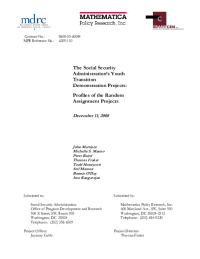Project Profiles from the Social Security Administration's Youth Transition Demonstration
The transition to adulthood for youth with disabilities, particularly youth receiving Supplemental Security Income (SSI) or other disability program benefits, can be especially challenging. In addition to the host of issues facing all transition-age youth, young people with disabilities face special issues related to health, social isolation, service needs, and lack of access to supports. These challenges complicate their planning for future education and work, and often lead to poor educational and employment outcomes, high risk of dependency, and a lifetime of poverty.
The public cost of child dependence on SSI is quite large. In April 2005, approximately 776,000 youth 14 through 25 years old were receiving SSI benefits totaling more than $340 million each month. Many additional youth receive Childhood Disability Benefits (CDB) payments or Social Security Disability Insurance (DI) benefits. Furthermore, thousands of youth whose applications for disability benefits have been denied are at high risk of receiving benefits in the future if they do not transition successfully to working in their adult life. This group includes youth whose disabilities currently are not severe, but who have a prognosis for decreased functioning over time, as well as youth who are income ineligible due to parental income, but who might be eligible if they were to move out of their parents’ households after reaching the age of 18.
Recognizing the importance of service intervention at this critical juncture in youths’ lives, the Social Security Administration (SSA) initiated the Youth Transition Demonstration (YTD) evaluation. SSA is providing funding to develop and rigorously evaluate promising strategies to help youth with disabilities become as economically self-sufficient as possible as they transition from school to work. Hallmark features of the YTD evaluation include (1) strong, policy-relevant demonstration projects that serve relatively large numbers of youth with disabilities compared with other programs, and (2) a rigorous evaluation design based on random assignment.
The YTD evaluation provides SSA with a valuable opportunity to identify program components and strategies that can show successful employment and earnings outcomes for youth. The demonstration is doing this by supporting and testing a multisite study with six interventions, all with a strong focus on employment, and with considerable leveraging of community services. The demonstration also includes waivers of certain SSI rules to help youth who work keep more benefits and provide them with incentives to obtain and retain employment. By testing a variety of service delivery models on the target population of youth with disabilities, combined with the provision of SSA waivers, this demonstration provides a unique opportunity to learn about effective interventions to increase employment and earnings for youth with disabilities, and eventually reduce their reliance on SSA disability benefits.
In partnership with SSA, the YTD evaluation is being led by Mathematica Policy Research, Inc., a nonpartisan firm that conducts policy research and surveys for federal and state governments, foundations, and private-sector clients. Mathematica has assembled a multidisciplinary team, including key partner organizations MDRC and TransCen, Inc., to design and conduct the evaluation and to provide technical assistance to the projects as they develop and implement their YTD interventions.
This report profiles the six YTD projects that have been selected for rigorous evaluation. The following chapters discuss each of these projects in turn. A profile of each project is provided, focusing on the services provided. Before turning to the project profiles, we briefly describe the conceptual framework underlying the YTD interventions and the process for selecting these projects.






